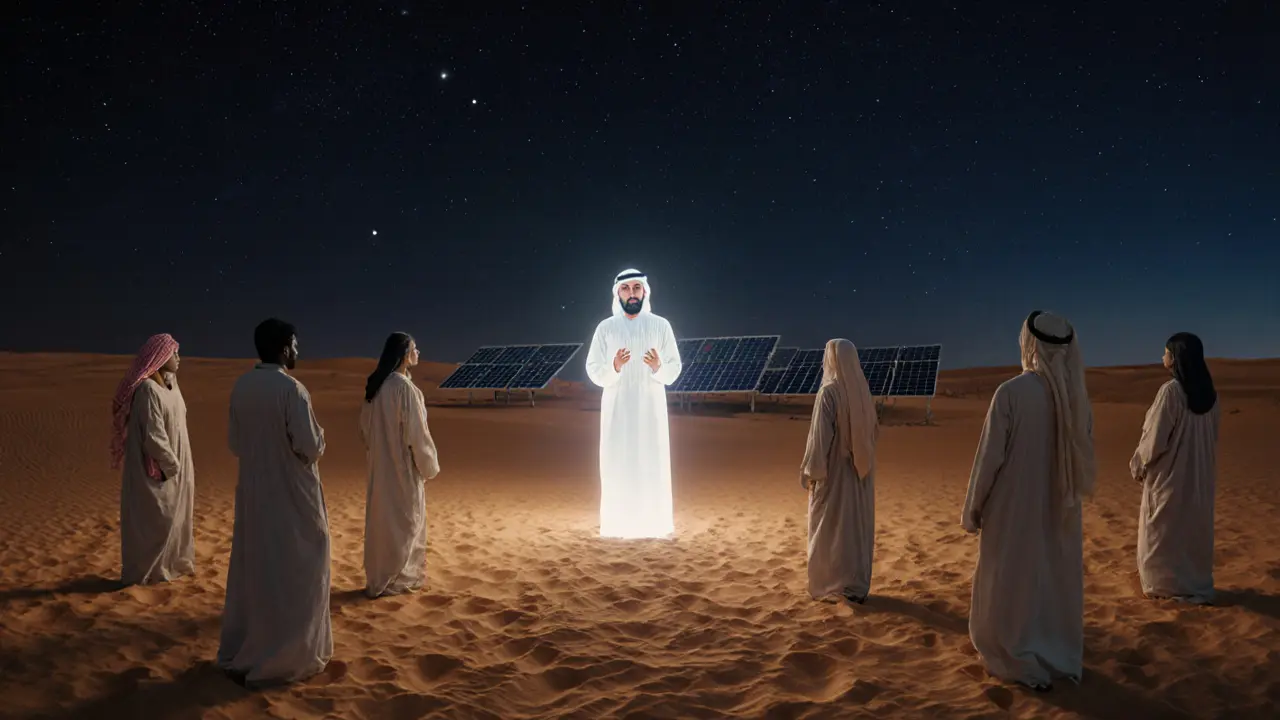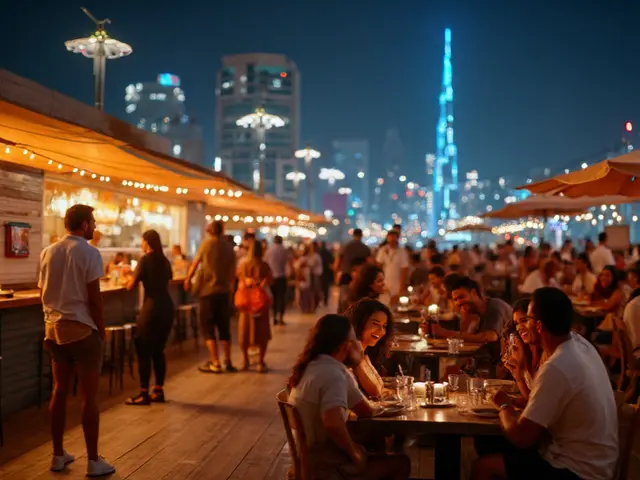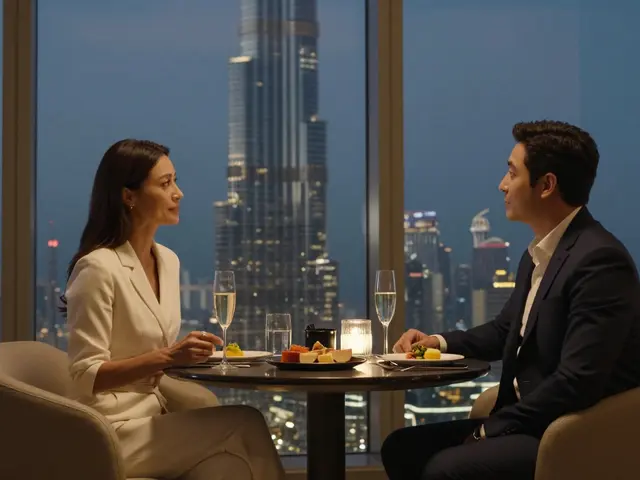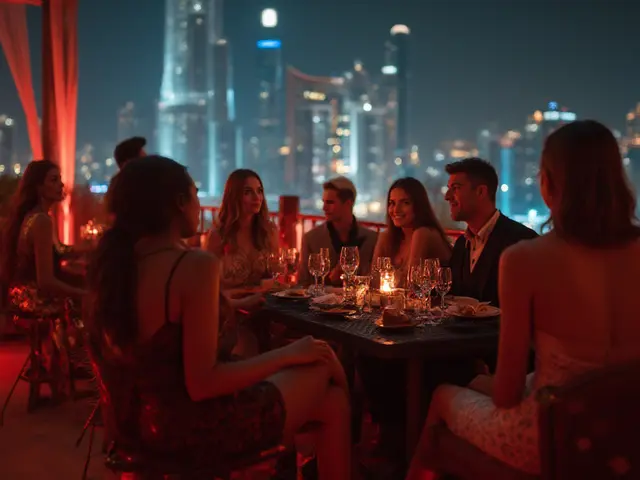In Dubai, entertainment events aren’t just about parties or concerts-they’re evolving into full-sensory experiences that blend culture, tech, and scale like nowhere else on Earth. From the glittering skyline of Downtown to the quiet dunes of Al Marmoom, the city’s event scene is shifting fast. What used to mean a DJ set at a beach club or a fireworks show over the Burj Khalifa now includes holographic performers, AI-curated guest lists, and pop-ups that vanish after 72 hours. If you’re living in Dubai or visiting soon, you need to know what’s next-not just what’s trending.
Immersive Tech Is Replacing Traditional Stages
Remember when a live concert meant lights, speakers, and a stage? In Dubai, that’s becoming rare. At Dubai Entertainment Events, the focus is now on immersion. Take the Future Music Lab at Dubai Design District (d3), where attendees wear haptic vests that sync with bass drops, and AR glasses overlay animated visuals only visible through the lens. No screens. No projections. Just you, the music, and digital creatures dancing above the crowd.
Similarly, the Desert Dome at Al Marmoom uses 360-degree audio and scent diffusion to simulate a night under the stars-complete with the smell of oud smoke and the sound of wind over dunes-while a live Arabic oud player performs alongside AI-generated ambient tones. These aren’t gimmicks. They’re what locals expect now. A 2025 survey by Dubai Culture found that 78% of residents would pay more for an event that engages multiple senses.
The Rise of Micro-Events and Hidden Experiences
Big isn’t always better in Dubai anymore. The city’s elite-and many expats-are turning away from massive festivals like RTF or Electric Daisy Carnival. Instead, they’re chasing exclusivity. Think: a seven-course tasting menu in a private dune cave near Al Qudra, paired with a live Sufi drum circle. Or a midnight cinema under the Burj Al Arab, showing only films directed by Emirati women, with seating arranged in traditional majlis style.
Brands like Alserkal Avenue and The Third Line are hosting invite-only art-tech hybrids: one recent event let guests use blockchain tokens to bid on digital artworks projected onto the walls of a restored 1970s Emirati house. Attendance was capped at 50. You had to be on a curated list. No public tickets. No Instagram posts allowed. That’s the new luxury in Dubai’s entertainment scene.
Cultural Fusion Is No Longer Optional
Dubai’s entertainment future doesn’t ignore its roots-it leans into them. You’ll see more events that blend Bedouin traditions with modern tech. At the Heritage Pulse festival last spring, attendees wore smart abayas embedded with LED threads that changed color based on the rhythm of traditional Khaleeji music. A drone swarm formed geometric patterns inspired by Islamic architecture above the Dubai Opera.
Even nightlife is adapting. At Al Funoon, a new lounge in Jumeirah, the playlist switches between Emirati folk songs and deep house based on the temperature of the room. Sensors detect body heat, and the music responds. It’s not just a club-it’s a living cultural experiment. And it’s packed every Friday night.
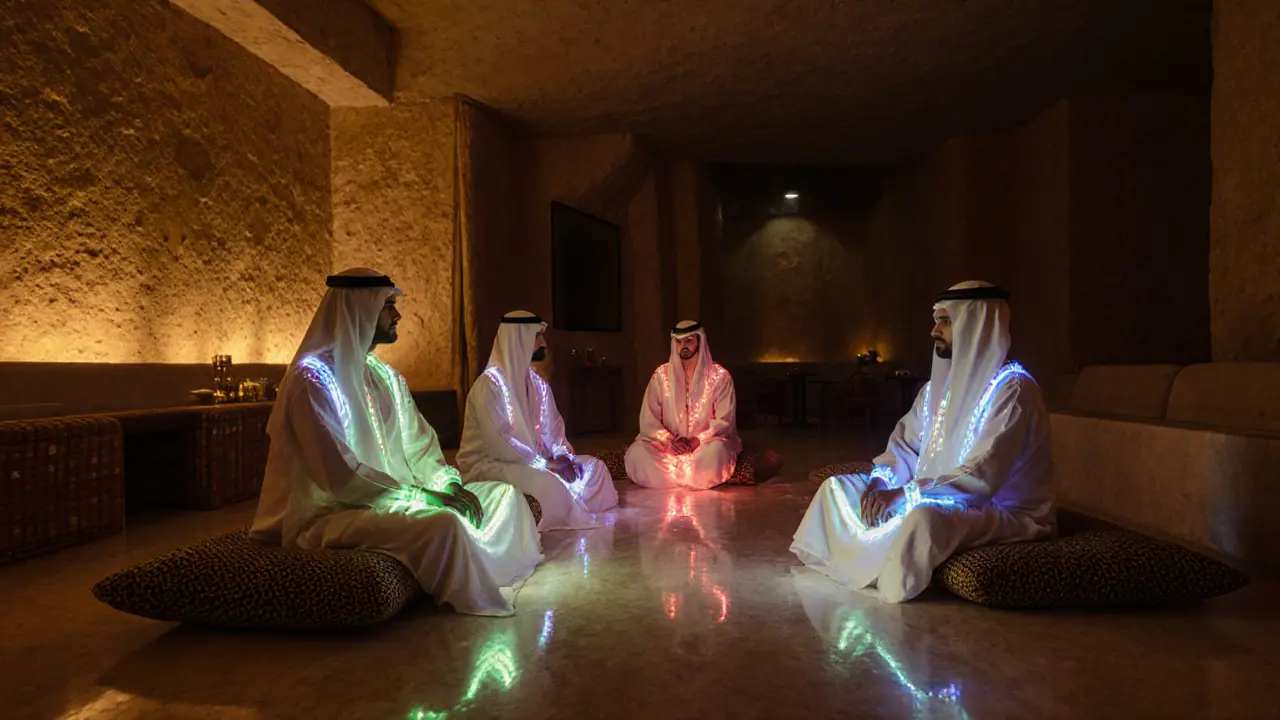
Weather Is the New Gatekeeper
Dubai’s heat isn’t just a challenge-it’s a design constraint. In 2025, nearly all major events are built around the climate. Outdoor events now happen between 9 PM and 2 AM, with shaded zones cooled by misting systems powered by solar energy. Indoor venues are getting smarter: the Dubai Mall’s entertainment wing now uses AI to adjust humidity and airflow based on crowd density. If 5,000 people enter a zone, the system kicks in instantly.
Even beach clubs like White Dubai and Puro Beach have installed retractable glass domes that open to the sky but seal shut if temperatures hit 38°C. You can still dance barefoot on sand, but now you’re protected by climate tech that feels like magic.
Events Are Becoming Data-Driven
Behind every great event in Dubai is a dashboard. Organizers now track everything: how long people stay at each station, which food stalls get cleared first, even how often guests check their phones during a performance. At the Soundwave Festival last year, organizers used facial recognition (opt-in only) to personalize the next day’s playlist based on emotional reactions captured during the show.
One result? A 40% increase in repeat attendance. People don’t just go to events-they return because they feel seen. If you’re an event planner in Dubai, your job isn’t just booking talent anymore. It’s reading data, predicting moods, and crafting experiences that feel personal.
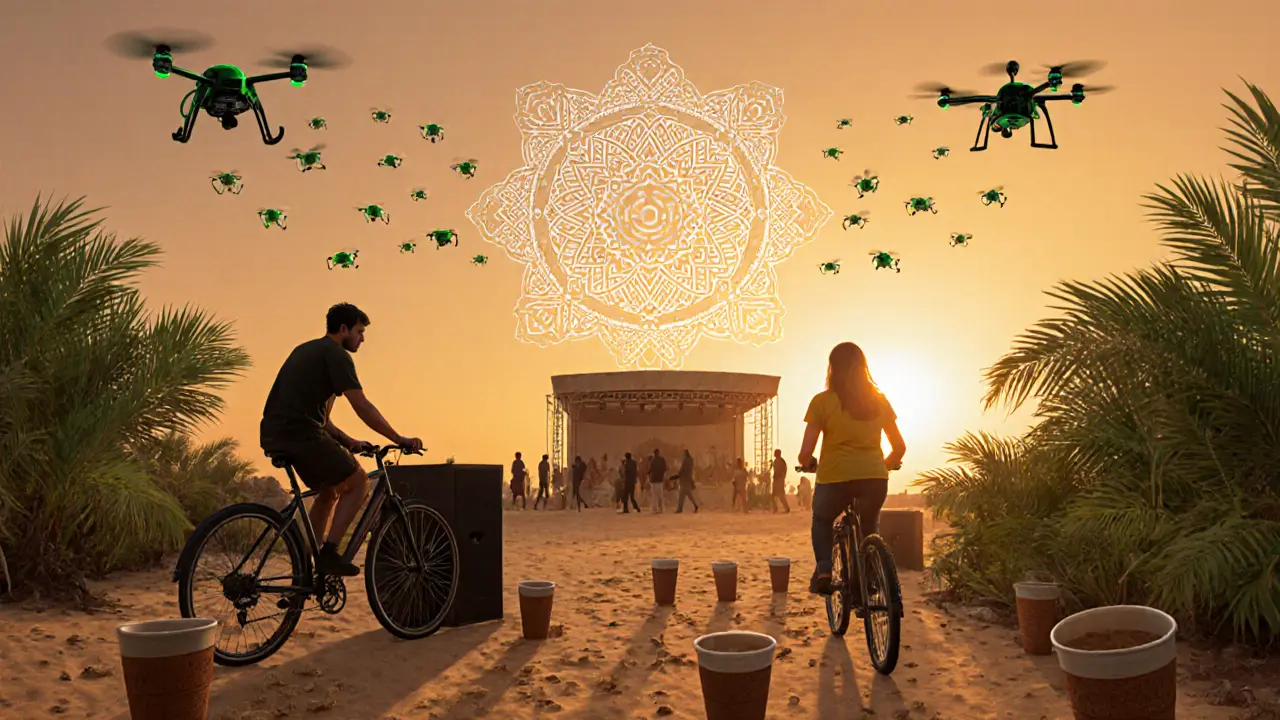
What’s Next? The Unseen Shifts
The biggest change coming? Events are becoming hybrid by default. You don’t need to be in Dubai to attend. The Dubai Heritage Experience last month streamed a live, interactive tour of the Al Fahidi Historic District with haptic feedback gloves-so users overseas could feel the texture of traditional wind towers while listening to oral histories in Arabic, English, and Urdu. Attendance from 112 countries hit 2.3 million.
And then there’s sustainability. Dubai’s new event policy requires all large-scale gatherings to use biodegradable materials, offset carbon emissions through local mangrove planting, and source food from Emirati farms. The Green Pulse Festival in November 2025 will be the first zero-waste event in the UAE, with compostable cups made from date palm fibers and music powered by pedal stations.
What This Means for You
If you’re a resident: stop scrolling for the next big party. Start asking: Is this experience unique to Dubai? Does it honor local culture? Is it built for the climate? The best events now feel like they could only happen here.
If you’re a visitor: skip the generic Dubai tours. Book something that doesn’t show up on TripAdvisor. Look for events hosted by local collectives-Al Tayer, Rawabi, Dubai Arts Initiative. These aren’t commercial gigs. They’re cultural statements.
If you’re in the industry: stop copying what works in London or New York. Dubai doesn’t need another EDM festival. It needs experiences that reflect its contradictions-ancient and futuristic, private and public, desert and skyline. That’s the real edge.
Where to Find the Next Big Thing
- Dubai Culture App - Official calendar of curated events, updated daily. Filters by “immersive,” “cultural,” or “climate-safe.”
- Alserkal Avenue Events Hub - Hidden gem for art-tech hybrids. No website. Follow @alserkal.events on Instagram.
- Desert Nights Collective - Pop-ups in Al Marmoom. RSVP only. Requires a referral from a past attendee.
- Dubai Mall’s Event Tunnel - Underground space with rotating installations. Free entry. Open 7 PM-2 AM.
The future of entertainment in Dubai isn’t about bigger stages or louder music. It’s about deeper connection-between people, place, and technology. And it’s already here.
Are there any new rules for hosting events in Dubai in 2025?
Yes. As of January 2025, all large-scale events in Dubai must meet three new criteria: carbon offsetting via local mangrove planting, use of biodegradable materials (no single-use plastics), and sourcing at least 60% of food from Emirati farms. Events must also include a cultural element-like traditional music, storytelling, or craft-unless approved for exemption by Dubai Culture.
Can tourists attend exclusive or invite-only events in Dubai?
Yes, but not through public channels. Many exclusive events-like private desert dinners or art-tech pop-ups-allow tourists to join via curated platforms like Dubai Insider or through partnerships with luxury hotels (e.g., Burj Al Arab, Armani Hotel). You won’t find these on Eventbrite. You need a personal invitation or a recommendation from a local host.
What’s the most unique tech-driven event happening in Dubai right now?
The Desert Hologram at Al Marmoom. A 12-meter-tall hologram of a Bedouin poet recites verses in Arabic, while motion sensors make the figure move in sync with your footsteps. It’s powered by solar energy and runs only at night. No tickets. Just walk in. It’s free, open to all, and has drawn over 80,000 visitors since June 2025.
How do I find events that respect Emirati culture and aren’t just Western-style parties?
Look for events hosted by Dubai Culture, Alserkal Avenue, or local artists like Fatma Al Qasimi and Ahmed Al Shamsi. Avoid venues that advertise “international DJs” or “open bar” as the main draw. Instead, search for keywords like “heritage,” “oral tradition,” “Emirati sound,” or “sustainable celebration.” These events often don’t have big ads-they’re shared through word of mouth or local community groups.
Is it still worth going to beach clubs in Dubai in 2025?
Only if you’re looking for climate-controlled luxury. Beach clubs like White Dubai and Puro Beach now offer retractable domes, misting systems, and solar-powered sound. The vibe is more relaxed-less screaming crowds, more curated playlists blending Arabic rhythms with deep house. They’re still popular, but they’ve evolved from party spots into lifestyle destinations. If you want noise and chaos, go to a nightclub. If you want atmosphere, go to a beach club.
For those who live here, the future of entertainment isn’t about what’s loud-it’s about what lingers. A scent of oud. A hologram in the sand. A poem that moves with your steps. That’s what Dubai is building now.
